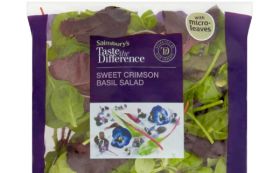Sainsbury’s
Sainsbury’s has launched a new range of salads which include edible blossoms and micro-herbs.
The retailer said the move responds to food trends it has identified among its customers.

The range includes Taste the Difference (TTD) Sweet Crimson Basil Salad, including micro-leaf crimson basil, colourful baby leaves, and viola flowers; TTD Aromatic Oriental Salad, comprising coriander and purple shiso, with tender baby spinach, sweet red batavia lettuce and tatsoi; TTD Powerful and Punchy Salad, featuring wild rocket and tender baby watercress, with savoury baby red chard, spicy young nasturtium leaves, micro-leaf rocket and radish cress.
Georgina Lunn, Sainsbury’s product developer for fresh produce, said: “We’ve seen a trend for customers making everyday food more exciting, and this new range of salads helps them to create salads which are full of colour, texture and intriguing flavours using more exciting leaves, micro-herbs and even edible flowers.
“We’ve used viola flowers, which have a velvety texture, intense purple colour with a lettuce-like flavour – the perfect finishing touch to a summer salad.”
The new range of bagged salads launch in Sainsbury’s this week from 27 April 2015, and are widely available in store and online priced at £1.75.
Service started in first store this week, with 99 others set to offer it before the end of 2015
Sainsbury’s is rolling out a brand new service to give customers a quick and convenient option to pick up the shopping they’ve ordered online from store.
The first collection service from store went live on Tuesday (3 March) at the Water Lane store in Farnham, Surrey, with nearly 20 more going live in the next two weeks.

A hundred stores are in the pipeline to deliver the service by the end of the year.
Sainsbury’s customers shopping online in catchment areas where a collection service is available will be given the option, in addition to still being able to book the usual home delivery slots
Customers can then choose a participating store and collection time to pick up their shopping from a refrigerated van which will be parked in a designated area in the store’s car park.
Sainsbury’s online director, Robbie Feather, said: “This is yet another step for Sainsbury’s increasingly popular online service, and a demonstration of our commitment to giving our customers more convenient ways to shop with us, wherever and whenever they want.
“We’ll have 20 locations live by the end of March and will quickly roll out our service from there, incorporating feedback from our customers and colleagues as we go.”
The free collection slots will be available at eligible stores from Monday to Saturday from 8am to 1pm, and then 2pm until 8pm in the evening. The service will also be available during store opening times on a Sunday.
All collections are subject to a minimum £20 spend, with no collection charge. Customers can place orders up to 20 days in advance. The latest an order can be placed for next day collection is 11pm, and collection slots will be subject to availability.
New winter range claims to be first time LED technology has been used to expand British tomato season on commercial scale
Sainsbury’s has said it is the first major retailer to grow British tomatoes at this time of year using LED lights.
The UK’s third largest supermarket said it has extended the British tomato season with the largest range of UK-grown tomatoes available through the winter months.
Its new Taste the Difference winter range includes new yellow cherry tomato Sunglow, large vine tomato Jubilee, cherry tomato on the vine Vittoria, and a Best of British mixed colour cherry pack.

The news comes as Sainsbury’s continues to expand its British offering as part of its 20×20 Sustainability Plan, in which it pledged to double the amount of British food its sells by 2020.
Nigel Bartle, chairman of the British Tomato Growers Association said: “Growers have been working tirelessly hard both with researchers and Sainsbury’s to extend the season and this year thanks to LED technology will be able to produce more fresh British tomatoes than ever before.”
“This is the first time a large-scale commercial nursery has used this technology in the UK.”
Sainsbury’s product technologist, Melissa Jones, said: “By working closely with our growers we’ve been able to extend the British tomato season – which takes a lot of skill and investment from our growers.”
She said growers used a mixture of sodium and LED lights to help plants to grow and tomatoes to ripen.
“It’s important we offer British products when they taste their best and we know our customers care about buying British too. This range of tomatoes is another example of growing more of our favourite fruit and veg closer to home,” added Jones.
Supermarkets need to shut stores to save costs, as price cuts are ‘not enough’ to fend off competition from discounters
Retailers must shut down one in five of their stores in order to turn around flagging sales figures and reboot the grocery market, a report has said.
A large-scale closure programme is the “only viable solution” to return to profitable growth for the major supermarkets, the study found, and said price cuts alone will not win the battle against hard discounters Aldi and Lidl.
“We believe that any major price investments by Morrisons, Sainsbury’s or Tesco can be exceeded by the discounters,” said analyst Rob Joyce of report authors Goldman Sachs.

The report found that as over half of Tesco’s stores are bigger than 40,000 sq ft, the UK’s largest retailer will have the biggest problem.
And it said that multiple supermarkets would suffer like-for-like sales declines of three per cent a year until 2020, unless they begin to close stores.
“Our analysis of the UK grocery industry suggests capacity exit is the only viable solution for a return to profitable growth,” the report said.
The latest grocery share figures from Kantar Worldpanel, published today for the 12 weeks ending 9 November 2014, show that all the top four retailers have lost market share, while Aldi and Lidl have grown (up 25.5% and 16.8% respectively).
Fraser McKevitt, head of retail and consumer insight at Kantar, said: “The declining grocery market will be of concern to retailers as they gear up for the key Christmas trading season. The fight for a bigger share of sales has ignited a price war which means an average basket of everyday goods such as milk, bread and vegetables now costs 0.4% less than it did this time last year. This is bad news for retailers, but good news for shoppers with price deflation forecast to continue well into 2015.”
Sainsbury’s has announced a £150m investment in price cuts as it revealed a 2.1% fall in like-for-like sales.
Sainsbury’s released its interim results for the 28 weeks ending 27 September 2014, showing underlying profit before tax down 6.3% to £375m from £400m in 2013/2014. Underlying basic earnings per share were also down significantly, by -12.7% to 14.5p compared with 16.6p in 2013/2014.
The supermarket, alongside Tesco, Asda and Morrisons, has been hard-hit by the success of discount brands Aldi and Lidl.

To combat this, Sainsbury’s said it would invest £150m in reducing prices, half of which will fall in the second half of 2014/15 and the remainder in the first half of 2015/16.
Moreover, Sainsbury’s stated it would work closely with its suppliers to provide lower prices for it customers and “deliver value chain efficiencies which can be reinvested in price”.
Chief executive Mike Coupe said Sainsbury’s would continue to put customers first: “We will continue to differentiate ourselves from a position of strength by offering great products and services at fair prices, investing in the quality of our food and investing in price in areas where our customers tell us it matters most. By knowing our customers better than anyone else, we will continue to serve them through multiple channels and in ways that make their lives easier, regardless of changes in the market. Our colleagues will remain our greatest asset; we will invest in their training and development to ensure they can continue to deliver industry-leading service.”
David Tyler, chairman, said: “The UK grocery sector has become increasingly challenging in recent months. As a result, we have evolved our strategy and believe this will allow us to build on our heritage and past success, especially as it will be delivered by the most experienced management team in the industry.”
Dragon’s Den star Alf Turner has launched a new spiced sausage, Dragon’s Fury, which will be launched into 200 Asda stores.
After securing investment from Dragon Peter Jones, Alf Turner launched the Dragon’s Egg scotch egg and it’s Hair of the Hog and Best of British sausages into Sainsbury’s stores earlier this year.

Produced by retail pork supplier Tulip, the Dragon’s Fury sausage will contain the same meat as the Dragon’s Egg.
Simon Harrington, senior brand and licencing manager at Tulip, said: “Tulip has supported Paul in launching the Dragon’s Egg, Best of British, Hair of the Hog and now the Dragon’s Fury sausages, which are manufactured at our Bromborough and Ruskington sites.
“We are really starting to see momentum building with the Alf Turner brand. These are premium products, which certainly have a place in the market, and I am confident we will see them on more and more supermarket shelves in the months ahead.”
The Dragon’s Fury range will be retailed at £2.50 per pack, with 2p per pack donated to the Help for Heroes charity.
Retailer launches new price match scheme that compares with Aldi and Lidl as well as top four on branded and own-brand items
Morrisons has launched the first-ever price match scheme that compares with discounters Aldi and Lidl, as well as Tesco, Sainsbury’s and Asda.
The scheme, named ‘Match and More’, will refund any differences in price of comparable products as points onto cards, using price data from independent analysts Profitero.

The retailer said that if Lidl is 60 pence cheaper than Morrisons then 600 points are added to a shopper’s Match & More account.
It will launch as a phased roll-out starting today (3 October) and will be in stores in time for Christmas.
When 5,000 Match & More points are collected the customer receives a £5 voucher at the till, while shopper information from the cards will be collected and used to tailor future offers.
Morrisons CEO Dalton Philips said the retailer has learned from other price match programmes so customers will not collect lots of small vouchers or have to redeem them online when they get home.
“Because it price matches the discounters, the Match & More card will provide the ultimate guarantee about Morrisons’ value-for-money,” he said.
Morrisons said it also has plans to allow points to be redeemed as vouchers for leisure activities such as eating-out and travel.
Price matched products will cover branded and own-brand products as well as items that are on promotion elsewhere.
Sainsbury’s has announced new technology for its sheep farmers, which will “effectively manage parasites, increasing product quality”.

The parasite management technology, Fecpak, allows farmers real-time feedback on parasites, as opposed to sending samples away for testing, which can take time, thus allowing for more regular testing. The technology is being supplied by New Zealand company Techion Group.
According to Techion, after nutrition, parasites are the largest influencing factor on animal performance. “The problem of increasing drug resistance from parasites to the drenches designed to kill them means we have to be smarter on how and when we use them, so it’s important to make use of new technologies to make better decisions,” explained Greg Mirams, founder and managing director of Techion.
The supermarket has already piloted the technology with its sheep farmers. Gareth Owen, a Leicestershire sheep farmer who has been testing the system since December, said “Fecpak is user-friendly and puts accurate information at our fingertips, so we can make decisions sooner on whether we need to drench or not.”

Sainsbury’s is supporting the project through its Agricultural R&D Grant Scheme. Philip Hambling, agriculture manager for lamb and pork at Sainsbury’s, said: “We are delighted to support this project as it makes egg-counting more reliable. More frequent counting will give our farmers the power to make informed decisions that benefit the performance of the flock and make more effective use of anthelmintics.”
Discounter Netto will return to UK this year through £25m partnership between Sainsbury’s and Dansk Supermarked
Sainsbury’s has partnered with Danish retailer Dansk Supermarked to relaunch discounter Netto in the UK.

The joint venture will be trialled in 15 Netto stores to be opened in the UK by the end of 2015, with the first few opening their doors in northern England later this year. If successful, there are plans to roll-out the new format across the rest of the UK.
It will be headed by Morten Mberg Nielsen, ex-managing director of Netto International in Germany who has worked for Dansk Supermarked for 14 years.
The new Netto format, said to be “a complete departure” from the chain’s previous format in the UK, will emphasise fresh food and highlight seasonal products with a “when it’s gone it’s gone” offer. It will also provide Danish bread and pastries from an in-house bakery.
Sainsbury’s and Dansk Supermarked have both invested £12.5 million in the project, and a statement said that as a result of start-up costs, each partner expects a post-tax loss of between £5 and 10 million up to 31 March 2015.
“This joint venture provides a great opportunity for us to gain exposure to the high growth discount market for the first time in partnership with Dansk Supermarked,” said Mike Coupe, Sainsbury’s CEO designate.
“If successful, this trial has the potential to open up a new long term growth opportunity for us complementing our fast expanding convenience, online and non-food businesses, as well as our existing supermarket estate.”
Per Bank, CEO of Netto’s parent company Dansk Supermarked said: “It’s great to be bringing a new twist to the rapidly-growing UK discount sector.
“The discounter experience, operating model and systems of the Dansk Supermarked group, combined with Sainsbury’s UK market insight, property expertise and logistics excellence will help deliver a discounter format we think UK customers will love.”
The UK discount sector is currently worth around £10 billion and is forecast to double in value to approximately £20 bn in the next five years, according to the IGD.